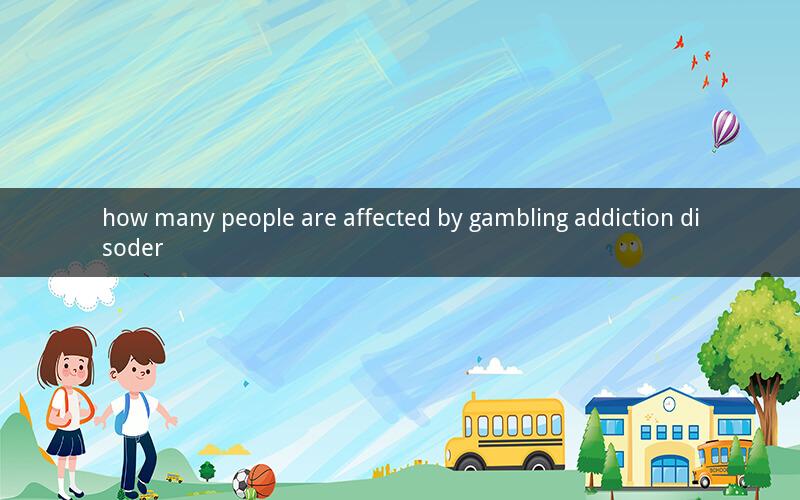
Table of Contents
1. Understanding Gambling Addiction Disorder
2. The Scope of Gambling Addiction
3. Demographics of Affected Individuals
4. The Impact on Mental Health
5. Societal and Economic Consequences
6. Prevention and Intervention Strategies
7. Case Studies and Real-Life Examples
8. The Role of Technology in Gambling Addiction
9. The Road to Recovery
10. Future Outlook and Research Directions
1. Understanding Gambling Addiction Disorder
Gambling addiction disorder, also known as compulsive gambling or problem gambling, is a behavioral addiction characterized by an inability to control the urge to gamble despite negative consequences. It is a complex condition that affects individuals across various age groups, genders, and socioeconomic backgrounds.
2. The Scope of Gambling Addiction
The prevalence of gambling addiction disorder varies across different regions and countries. According to the National Council on Problem Gambling (NCPG), it is estimated that 2-3% of the adult population in the United States is affected by problem gambling. However, these numbers may not fully represent the extent of the issue due to underreporting and the stigma associated with the disorder.
3. Demographics of Affected Individuals
Research indicates that certain demographics are more susceptible to gambling addiction. Men are more likely to develop gambling problems than women, and the risk increases with age. Young adults, particularly those between the ages of 18 and 25, also exhibit a higher prevalence of problem gambling.
4. The Impact on Mental Health
Gambling addiction disorder can have severe mental health consequences, including depression, anxiety, and substance abuse. The constant urge to gamble and the associated stress can lead to increased levels of stress hormones, which can exacerbate mental health issues.
5. Societal and Economic Consequences
The societal and economic impact of gambling addiction disorder is significant. Problem gamblers often experience financial difficulties, which can lead to job loss, bankruptcy, and other economic hardships. Additionally, the disorder can strain family relationships and increase the risk of domestic violence.
6. Prevention and Intervention Strategies
Prevention and intervention strategies for gambling addiction disorder involve a combination of education, counseling, and treatment. Education programs aim to raise awareness about the risks of gambling and promote responsible gambling practices. Counseling and therapy can help individuals manage their gambling behavior and address underlying psychological issues.
7. Case Studies and Real-Life Examples
Several case studies and real-life examples illustrate the devastating impact of gambling addiction disorder. For instance, a study published in the Journal of Gambling Studies found that a significant number of individuals with gambling problems experienced financial, legal, and personal consequences as a result of their addiction.
8. The Role of Technology in Gambling Addiction
The advent of technology has made gambling more accessible than ever before. Online gambling platforms, mobile apps, and social media have contributed to the rise in problem gambling rates. The convenience and anonymity of these platforms make it easier for individuals to develop gambling addictions.
9. The Road to Recovery
Recovery from gambling addiction disorder is a challenging process that requires time, effort, and support. Treatment programs often involve a combination of cognitive-behavioral therapy, support groups, and medication. The road to recovery is different for each individual, but with the right resources and support, many individuals can overcome their addiction.
10. Future Outlook and Research Directions
As gambling continues to become more prevalent, the need for research on gambling addiction disorder remains crucial. Future research should focus on identifying effective prevention and treatment strategies, exploring the role of technology in gambling addiction, and understanding the long-term effects of the disorder on individuals and society.
Questions and Answers
1. Q: What is the difference between gambling and problem gambling?
- A: Gambling is the act of betting on an event with uncertain outcomes, while problem gambling refers to a pattern of gambling behavior that leads to negative consequences in an individual's life.
2. Q: How can I identify if someone has a gambling addiction?
- A: Signs of a gambling addiction include lying about gambling activities, spending more time and money on gambling than intended, and experiencing negative consequences as a result of gambling.
3. Q: Are there any genetic factors that contribute to gambling addiction?
- A: Yes, research suggests that there may be a genetic component to gambling addiction, with certain genetic markers associated with an increased risk of developing the disorder.
4. Q: Can treatment for gambling addiction be successful?
- A: Yes, treatment for gambling addiction can be successful for many individuals. The key is to find the right combination of therapy, support, and resources that work for the individual.
5. Q: How can I support a loved one with a gambling addiction?
- A: Support a loved one by being understanding, patient, and non-judgmental. Encourage them to seek professional help and offer to accompany them to counseling sessions or support group meetings.
6. Q: What are the most common triggers for relapse in gambling addiction?
- A: Common triggers for relapse include stress, financial problems, and social situations that involve gambling.
7. Q: Can online gambling addiction be treated differently from traditional gambling addiction?
- A: While the underlying issues are similar, online gambling addiction may require additional treatment strategies, such as Internet blocking software and online support groups.
8. Q: How can I help prevent gambling addiction in my children?
- A: Teach your children about responsible gambling and the potential risks associated with gambling. Encourage open communication and provide a supportive environment.
9. Q: Are there any legal implications for individuals with gambling addiction?
- A: Yes, individuals with gambling addiction may face legal implications if their behavior leads to criminal activities, such as fraud or theft.
10. Q: Can gambling addiction be cured?
- A: While there is no cure for gambling addiction, it is a treatable condition. With proper treatment and support, individuals can learn to manage their addiction and lead a fulfilling life.